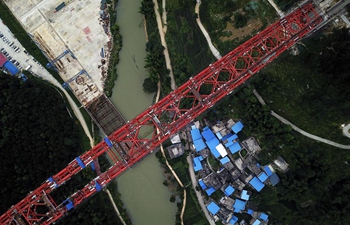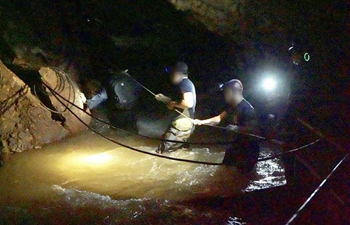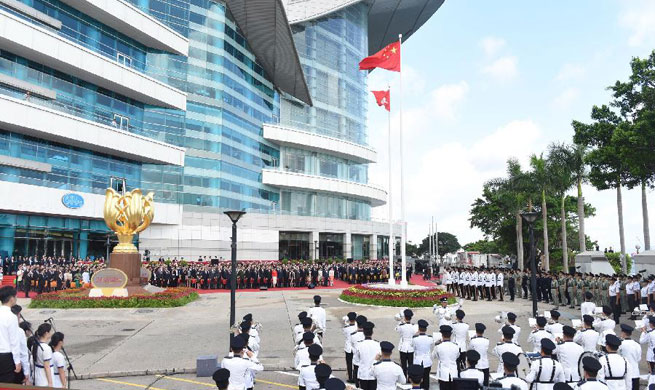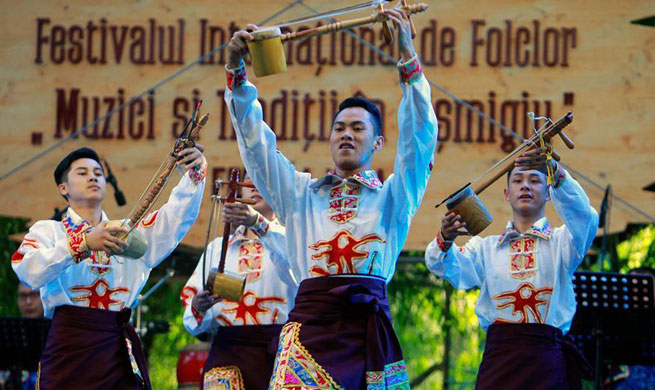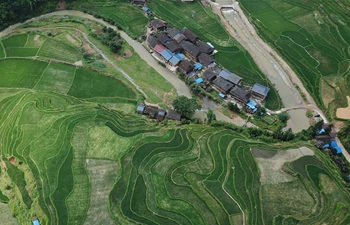GUIYANG, July 1 (Xinhua) -- Liu Mingxian, a 91-year-old village doctor in southwest China's Guizhou province, has been tending to the sick in mountains for over 60 years.
"This old man has a heart of gold!" said Zhou Hongxiu, who just got a dozen eggs from Liu for free. Liu takes great care of everyone and often gives eggs to villagers.
At the age of 13, he dropped out of school and joined his father as a street barber, before he became an apprentice to a traditional medicine practitioner. In 1949, he studied Western medicine and began his career as a doctor in a clinic in the mountains of Bouyei-Miao Autonomous Prefecture of Qiannan.
During the leprosy epidemic of the 1950s, hospitals were set up in remote areas to treat patients in isolation. In 1957, at the age of 30, and with knowledge of both Chinese and Western medicine, Liu took a job offer without hesitation in a leper house in Changshun County.
Carrying little more than rice and a shotgun, Liu and a colleague trekked through rocky foothills and thick forests to the village of Longling in the distant mountains where they were to work.
On the way, they slept on a tarpaulin on the floor of barns. During the night, when wild beasts were heard, Liu fired his shotgun into the sky to give himself courage.
The hospital was built from wood with a thatched roof to Liu's design, and could accommodate 200 patients, Two pigsties were restored and converted into living quarters. A horse was Liu's everyday transportation and he had remarkable results with his leprosy treatment combining Chinese and Western medicine.
In addition to his work with leprosy patients, Liu offered treatment to residents of nearby Miao ethnic villages, replacing the local midwife and delivering over 100 babies. His expertise and kindness changed the Miao superstition that male midwives were unacceptable.
In the eye of Liu's granddaughter Wang Xuefei, her grandfather's house was more like an outpatient department, with people knocking on the window in the middle of the night. Liu never refused any request, just put on his clothes and silently headed out with his lantern.
He never charged for treatment, and went into town every week to buy medical supplies with his own salary. When villagers came to his house at lunch time, they were always invited to stay and enjoy the meal.
In the 1990s, leper houses were shut down, former patients were sent back to their hometowns, and those yet to recover were transferred to county hospitals, but 17 stayed in Liu's township. Liu, who retired in 1991, also chose to stay.
"I always make sure my actions match my words," he said.
Today, villagers in surrounding areas have medical insurance, and few people seek Dr Liu's advice.
Jin Guozhen, 64, is one of the few leprosy patients who remain in the village. She was admitted to hospital in 1974, and is disabled though cured of the disease. She tells how Liu regularly gives her a check-up and offers support to her and other patients.
In the view of Liu, treating leprosy patients in the mountains is "a task from the Communist Party of China (CPC)." When 13-year-old Liu was giving a haircut on the street one day, he somehow irritated a captain of the police and was beaten. A CPC member rescued him.
"That was when I swore to dedicate my whole life to repaying the party," Liu said, and with his life-long dedication, he feels that he has "almost accomplished the task."
On June 26, he was formally inaugurated into the party.
Liu is destined to stay in the mountains. "I don't want to leave. I still can do something here," he said.?




